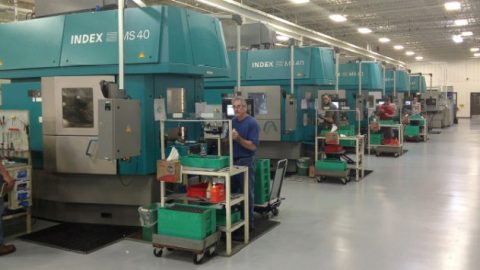
Hilite International is an automotive supply chain manufacturer, specializing in the development and production of systems and components to improve fuel consumption and reduce emissions. Based in Marktheidenfeld, Germany, the company employs 1,400 employees across eight locations in Europe, North America, and Asia—270 at the Whitehall, Michigan facility. Today, Hilite offers its specialized expertise of progressive engine and transmission technology to OEMs and other customers in the automotive industry.
CHALLENGE
Hilite is laser-focused on quality and efficiency, with a goal of zero defects throughout the production process. However, while Lean management tends to concentrate on eliminating waste and ensuring efficiency, Hilite wanted to get the product right the first time. Rather than spending extra time and money to rework defective parts, they wanted to eliminate defects all together.
The company already supports a Lean environment by monitoring the 8 Wastes of Manufacturing, implementing a 7S philosophy, and minimizing stock and resources with Just in Time Production and Kanban systems. The challenge was how to go even further. How could Hilite achieve their “zero defect” goal?
SOLUTION
After meeting with Hilite professionals and listening to their goals, the experts at Michigan Manufacturing Technology Center-West landed on the solution . . . Six Sigma.
The central idea behind Six Sigma is to measure how many defects are in a process, then systematically determine how to eliminate them, getting as close to “zero defects” as possible. Over a 14-week period, members of the company’s supervisory, engineering, quality and training departments participated in Lean Six Sigma Green Belt Certification.
Using the first three Six Sigma tools (Define, Measure and Analyze), the team worked to identify and understand the root cause of a problem on the company’s primary production line. Using the DMAIC tool, the team defined the problem and measured the loss. Implementing the tools from the training, analysis determined the root cause; we were able to isolate the issue and start corrective actions toward improvement. New systems were implemented and the process was standardized to control the issue so it could not happen again.
After continued monitoring, the issue was completely resolved using tools learned. From the starting cost of $205,365 in May, the complete zero defects goal was achieved in September, bringing the cost of defects to $0. To encourage zero defects across all areas of the production floor, the team created the “Quality Challenge” reward system in an effort to stop defective products from reaching controlled shipping inspection and, ultimately, the customer.
RESULTS
Source: Michigan Manufacturing Center